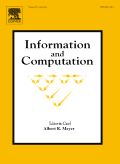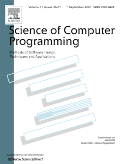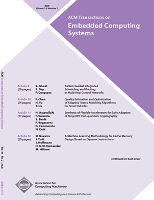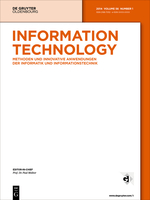
FORMAL METHODS IN SYSTEM DESIGN
metrics 2024
Pioneering formal methods for robust design.
Introduction
FORMAL METHODS IN SYSTEM DESIGN, published by Springer, is a pivotal journal in the fields of Hardware and Architecture, Software, and Theoretical Computer Science. With an ISSN of 0925-9856 and an E-ISSN of 1572-8102, it has been at the forefront of advancing the understanding and implementation of formal methods since its inception in 1992, with a convergence slated through 2024. Given its ranking in the Q3 category across multiple computer science disciplines, it serves as a critical resource for researchers and practitioners looking to enhance the reliability and performance of complex systems. The journal offers an excellent platform for disseminating high-quality research that addresses the rigorous analytical techniques required for system design, making it invaluable for academics, professionals, and students alike. Notably, FORMAL METHODS IN SYSTEM DESIGN is based in the Netherlands, with its offices located at VAN GODEWIJCKSTRAAT 30, 3311 GZ DORDRECHT, NETHERLANDS, and although it does not currently offer open access, the journal's comprehensive archive remains accessible for deeper research into the formal methodologies that shape contemporary computing paradigms.
Metrics 2024
 0.40
0.40 0.70
0.70 0.80
0.80 57
57Metrics History
Rank 2024
Scopus
IF (Web Of Science)
JCI (Web Of Science)
Quartile History
Similar Journals

International Journal on Software Tools for Technology Transfer
Exploring Cutting-Edge Tools for Effective Technology TransferInternational Journal on Software Tools for Technology Transfer (ISSN: 1433-2779; E-ISSN: 1433-2787), published by SPRINGER HEIDELBERG, stands as a pivotal platform for advancing the intersection of software engineering and technology transfer. Operating out of Germany, this esteemed journal has contributed significantly to the field since its inception in 1997 and continues to disseminate cutting-edge research through 2024. With a current impact footprint reflected in its Q2 status in Information Systems and Q3 in Software categories, it holds an impressive Scopus rank in the top 60th and 52nd percentiles respectively. Researchers, professionals, and students alike will find its commitment to exploring innovative software tools and techniques essential for enhancing technology transfer processes invaluable. Although the journal does not offer open access, its rigorously peer-reviewed articles are crucial for those seeking high-quality research insights.

Theoretical Computer Science
Pioneering Insights in Computational FrameworksTheoretical Computer Science, published by Elsevier, serves as a pivotal platform in the field of computational theory, exploring the foundational aspects of computer science and mathematical logic since its inception in 1975. With both a print ISSN of 0304-3975 and an E-ISSN of 1879-2294, this journal is esteemed for its rigorous peer-review process and commitment to advancing knowledge in theoretical frameworks and algorithms. Positioned in the Q2 quartile for both Computer Science (miscellaneous) and Theoretical Computer Science categories, it ranks #124 out of 232 in general computer science and #73 out of 130 in theoretical computer science according to Scopus metrics, reflecting its significant influence and reach within the academic community. Researchers and professionals can access this journal through institutional subscriptions, providing a plethora of high-quality articles that contribute to ongoing debates and developments in the discipline. The journal's scope encompasses a wide array of topics, ensuring relevance across various subfields, thus making it an essential resource for anyone dedicated to furthering their understanding of theoretical computer science.

INFORMATION AND COMPUTATION
Transforming Ideas into Impactful SolutionsINFORMATION AND COMPUTATION is a peer-reviewed academic journal published by Academic Press Inc., Elsevier Science, dedicated to advancing the fields of computational theory and mathematics, computer science applications, and information systems. With an ISSN of 0890-5401 and an E-ISSN of 1090-2651, the journal provides a platform for innovative research that spans theoretical and applied perspectives. Acknowledged for its impact in the community, it holds a Q2 quartile ranking in several categories, including Computational Theory and Mathematics and Computer Science Applications, as of 2023. These rankings place it among the leading journals in its field, making it an essential resource for researchers, professionals, and students aiming to stay abreast of cutting-edge developments. While it does not currently offer Open Access options, the journal intends to foster scholarly communication and knowledge sharing from its inception in 1987 to its future issues expected through 2024. Located in the United States, at 525 B ST, STE 1900, SAN DIEGO, CA 92101-4495, INFORMATION AND COMPUTATION is committed to publishing high-quality research that influences the theoretical foundations and practical applications of its diverse disciplines.

SCIENCE OF COMPUTER PROGRAMMING
Fostering Collaboration for a Dynamic Technological LandscapeScience of Computer Programming, published by Elsevier, is a leading journal dedicated to advancing knowledge in the fields of computer programming, computational theory, and software development. With a focus on interdisciplinary research that spans computational methodologies, information systems, and simulation modeling, this journal plays a vital role in disseminating innovative findings and fostering collaboration among experts in these dynamic areas. With a respectable impact factor and ranked in various Scopus Categories such as computational theory (Q3) and information systems (Q2), it provides a platform for high-quality scholarly articles that push the boundaries of programming science. Although currently not open access, the journal offers invaluable insights for researchers, professionals, and students alike, ensuring they are equipped with the latest advancements and methodologies to thrive in an ever-evolving technological landscape. The journal covers research from its convergence starting in 1981 and continues to welcome groundbreaking contributions as it looks forward to an exciting future through 2025 and beyond.

ACM Transactions on Embedded Computing Systems
Unveiling cutting-edge discoveries in embedded computing systems.ACM Transactions on Embedded Computing Systems (ISSN: 1539-9087, E-ISSN: 1558-3465), published by the Association for Computing Machinery, is a premier academic journal dedicated to advancing the study and application of embedded computing systems. With a focus on both hardware and software aspects, this journal holds a distinguished Q2 ranking in its field (2023) and has achieved notable recognition within Scopus rankings, particularly in Hardware and Architecture (Rank #97/177) and Software (Rank #231/407). Encompassing research from 2002 to 2024, it serves as a crucial platform for disseminating cutting-edge findings that drive innovation and foster scholarly dialogue among researchers, professionals, and students alike. Although it does not offer open access options, the journal remains essential for those seeking to deepen their understanding of the complexities of embedded systems, contributing significantly to the growth of knowledge across disciplines.

Logical Methods in Computer Science
Empowering discoveries at the intersection of logic and computation.Logical Methods in Computer Science is a premier Open Access journal dedicated to fostering scholarly dialogue within the realms of Computer Science and Theoretical Computer Science. Established in 2004 and published by LOGICAL METHODS COMPUTER SCIENCE E V in Germany, this journal aims to bridge theoretical frameworks and practical applications, providing a platform for innovative research and discoveries. With an impressive HIndex reflecting its commitment to high-quality research, Logical Methods in Computer Science has achieved a Q2 ranking in both the miscellaneous and theoretical categories of computer science, indicating its growing influence in the academic community. Researchers, professionals, and students are encouraged to access and engage with the wealth of knowledge this journal offers, which is freely accessible to facilitate widespread dissemination of cutting-edge advancements in logical methods. With its convergence period extending from 2005 to 2024, Logical Methods in Computer Science continues to be a vital resource for those looking to explore the intersections of logic, computation, and mathematics.

DISCRETE EVENT DYNAMIC SYSTEMS-THEORY AND APPLICATIONS
Advancing the Frontier of Dynamic Systems ResearchDISCRETE EVENT DYNAMIC SYSTEMS – THEORY AND APPLICATIONS, published by SPRINGER, is a premier journal dedicated to advancing the field of discrete event systems and their applications across various domains. With a distinguished Q1 ranking in Control and Systems Engineering, Electrical and Electronic Engineering, and Modeling and Simulation, this journal is at the forefront of research dissemination, offering a vital platform for scholars and practitioners alike. Covering a broad spectrum from theoretical foundations to practical implementations, the journal aims to foster innovative solutions, promote cutting-edge methodologies, and enhance understanding of dynamic systems. The journal encompasses a wide array of scholarly contributions, including original research articles, reviews, and case studies, while leveraging its prestigious standing to cater to its diverse readership of researchers, professionals, and students. Established in 1991, and continuing through 2024, DISCRETE EVENT DYNAMIC SYSTEMS remains a cornerstone for those interested in the complex interplay of systems dynamics, ensuring a significant impact in both academic and industrial sectors.

JOURNAL OF AUTOMATED REASONING
Shaping the Future of Artificial Intelligence ResearchJOURNAL OF AUTOMATED REASONING is a premier academic journal published by SPRINGER, focusing on the dynamic and evolving fields of Artificial Intelligence, Computational Theory and Mathematics, and Software. With an ISSN of 0168-7433 and E-ISSN 1573-0670, this journal ranks impressively in the second quartile (Q2) across multiple categories, reflecting its significant contribution to the advancement of knowledge in automated reasoning methodologies. Since its inception in 1985, it has served as a vital platform for researchers and professionals to share groundbreaking findings and innovative techniques, facilitating the exploration of algorithms, logical frameworks, and reasoning processes that underpin artificial intelligence systems. Although it does not currently offer Open Access options, it remains a highly regarded resource, cited widely in academia, with its impactful publications reflecting deep insights and rigorous scholarly standards. The journal’s esteemed status and its ongoing commitment to fostering a greater understanding of automated reasoning make it an invaluable asset for those dedicated to pushing the boundaries of these interdisciplinary fields.

Innovations in Systems and Software Engineering
Unveiling the Next Generation of Systems EngineeringInnovations in Systems and Software Engineering, published by Springer London Ltd, is a highly relevant journal dedicated to advancing the field of software engineering and systems innovation. With an ISSN of 1614-5046 and E-ISSN 1614-5054, this journal serves as a key platform for researchers and practitioners to share their insights, cutting-edge research, and developments from 2005 to 2024. Positioned in the Q3 category for software within the 2023 metrics and ranked #219 out of 407 in Scopus, the journal highlights its commitment to addressing the evolving challenges and opportunities in software systems. Although not open access, it maintains a rigorous peer-review process to ensure the dissemination of quality research. As the field continues to grow in complexity, Innovations in Systems and Software Engineering is vital for fostering collaboration and innovation among professionals, students, and researchers aiming to shape the future of software engineering.

IT-Information Technology
Connecting Researchers to IT BreakthroughsIT-Information Technology, published by WALTER DE GRUYTER GMBH, is a prestigious academic journal based in Germany that focuses on the multifaceted developments in the field of information technology. With an impressive Q2 ranking in Computer Science (Miscellaneous) and a Scopus ranking of #87 out of 232, this journal serves as a vital resource for researchers, professionals, and students interested in the latest advancements and research across various aspects of IT. Although currently operating under traditional access options, its rich repository of knowledge spans significant periods, notably from 1987 to 1988 and 1996 to 2024, making it essential reading for those seeking to deepen their understanding of computational innovations and methodologies. The journal's commitment to publishing high-quality research ensures that it remains a key player in shaping the discourse within the IT community.